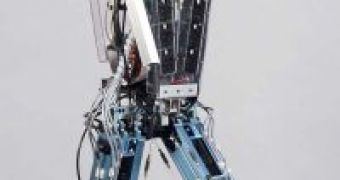A new highly advanced walking robot dubbed Flame was developed recently by researcher Daan Hobbelen from TU Delft as part of his PhD research focused on revealing the way people walk. For his research Hobbelen will receive his PhD next week, on May 30. Hobbelen's findings could provide a valuable insight into new techniques meant to diagnose, train and rehabilitate people with walking difficulties.
People take bipedal walking for granted but never realize what a complex process it is. The fact that there aren't many walking robots around the world is testimony to this observation. Nevertheless, walking robots have been around us for almost four decades. They can be divided into two types.
Those that run according to predetermined routines, such as industrial robots, can eventually achieve excellent results if sufficient time and money are invested, although they lack the flexibility, efficiency and are greatly restricted by their high costs.
Then there are the robots that mimic the walking style of animals, such as humans, which are not restrained by the restrictions imposed by the program coding and move in a much more energy efficient and natural way. Flame is one of those robots. With its help, Hobbelen proved that energy efficient and highly stable robots can be built and used as a means to measure the stability of people learning to walk for the first time.
Flame makes use of seven motors and a series of sensors that, along with the programming part, help it maintain a high level of stability while walking. By corroborating the information received from its sensors with measurements such as the position of its feet, Flame is able to prevent a potential fall. It is probably the most advanced robot in the world at this moment, said Hobbelen, or at least from the class of robots that learn how to walk by making use of human methods.
In the end, this learning process could help researchers build more advanced two legged robots that walk in a natural way.

 14 DAY TRIAL //
14 DAY TRIAL //